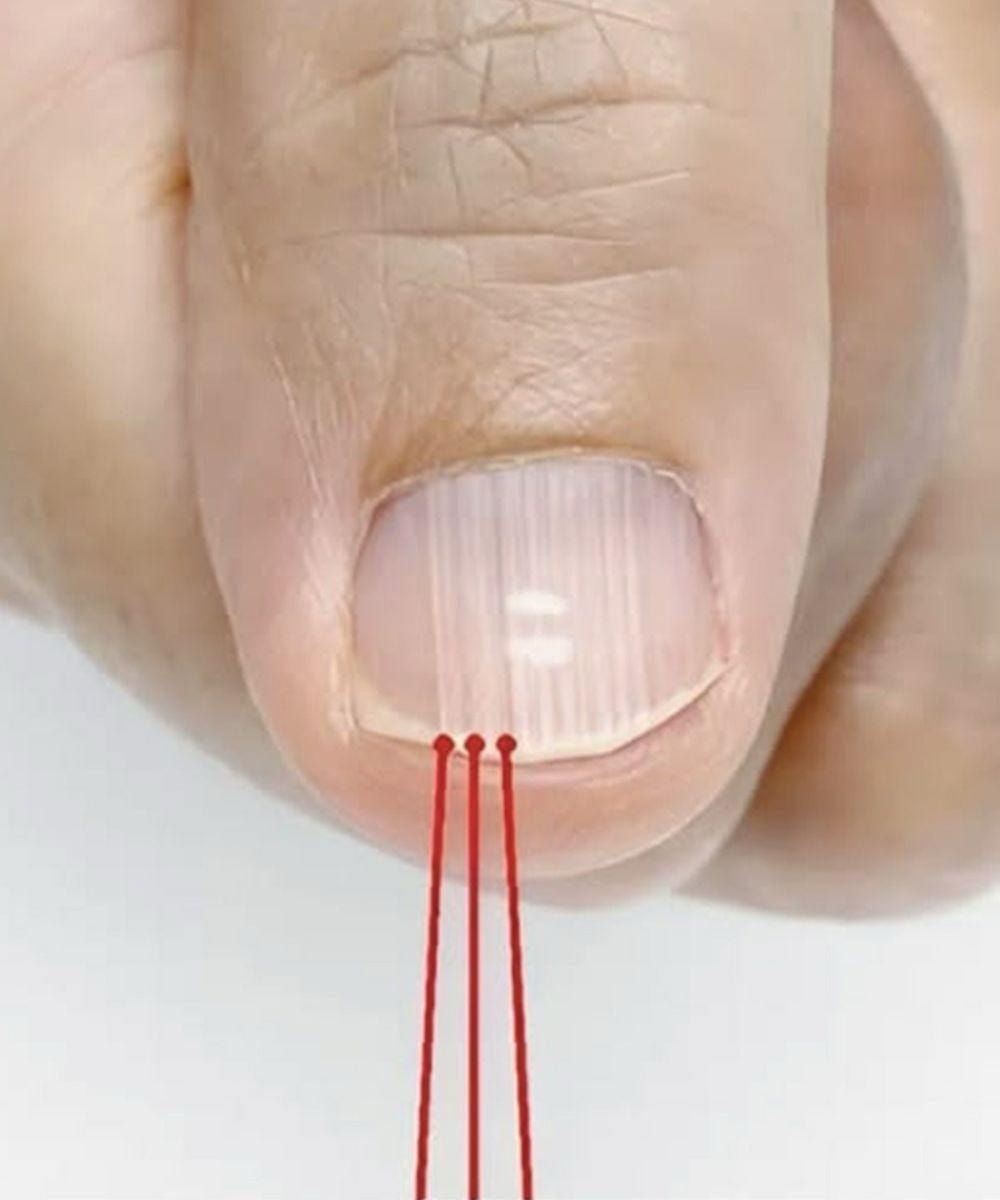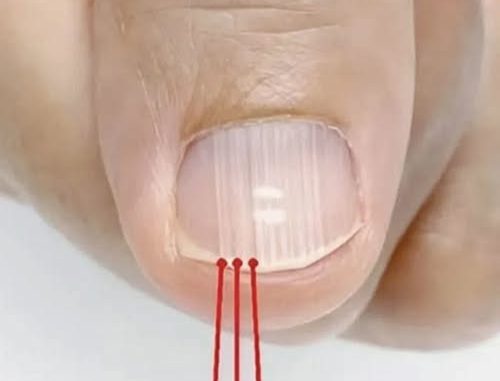
Nail Ridges After 40: A Common But Overlooked Sign of Aging
As people age, they often notice changes in skin, hair, and joints—but fingernails also undergo transformation. One of the most common and visible changes after age 40 is the appearance of vertical lines or ridges on the nails. These ridges, known medically as longitudinal striations, run from the base of the nail (near the cuticle) to the tip. While usually harmless, they can sometimes hint at deeper health or nutritional concerns.
Understanding what these lines mean, what causes them, and how to respond is key to maintaining not just nail health but overall well-being.
What Are Vertical Nail Ridges?

Vertical ridges are linear elevations that extend from the cuticle to the tip of the nail. They are distinct from horizontal ridges (Beau’s lines), which are more often associated with serious systemic stress or illness.
In many cases, vertical ridges are simply a normal sign of aging, much like wrinkles or graying hair. However, changes in the depth, number, or texture of these ridges can indicate underlying issues that warrant attention.
Why Vertical Ridges Appear More Prominently After Age 40
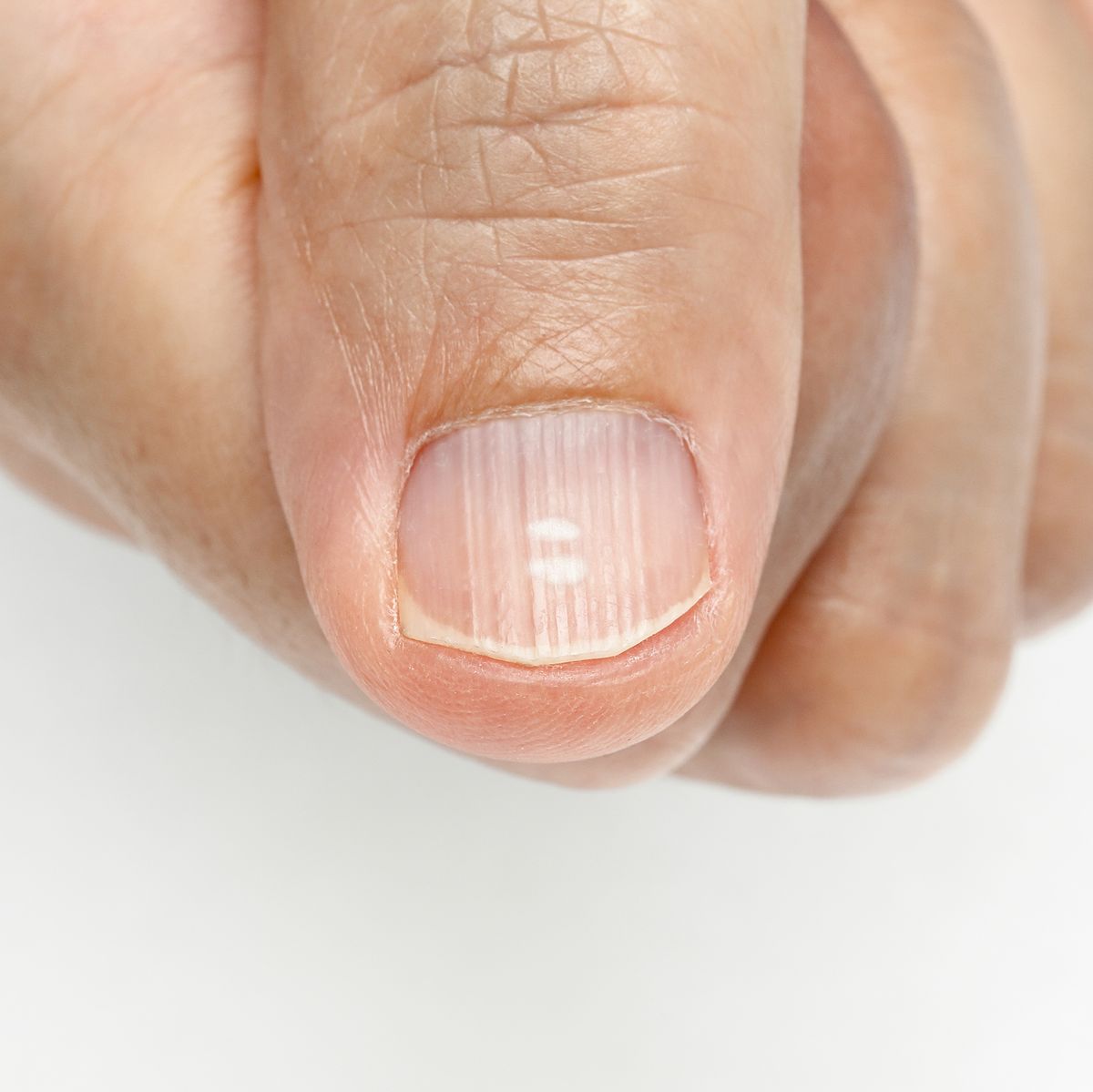
Structural Changes in the Nail Matrix
The nail matrix, located beneath the cuticle, is where nail growth begins. As a person ages, the efficiency of cell turnover in the nail matrix slows down. This results in inconsistent production of keratin—the primary structural protein of the nail—leading to uneven surfaces or ridging.
Reduced Keratin Production
Keratin production slows with age due to changes in hormone levels, slower metabolism, and general wear and tear. This makes the nail plate thinner and more likely to develop surface irregularities.
Loss of Moisture and Oil
Natural oils and moisture in the nail bed help keep nails smooth and pliable. With age, sebaceous gland activity decreases, leading to drier nails. Dehydrated nails tend to show ridges more prominently.
External Exposures Accumulate Over Time
Decades of exposure to handwashing, cleaning agents, manicures, and environmental stressors can compound over time, gradually weakening the nail plate and accentuating ridges.
Nutritional Deficiencies That May Contribute to Nail Ridges
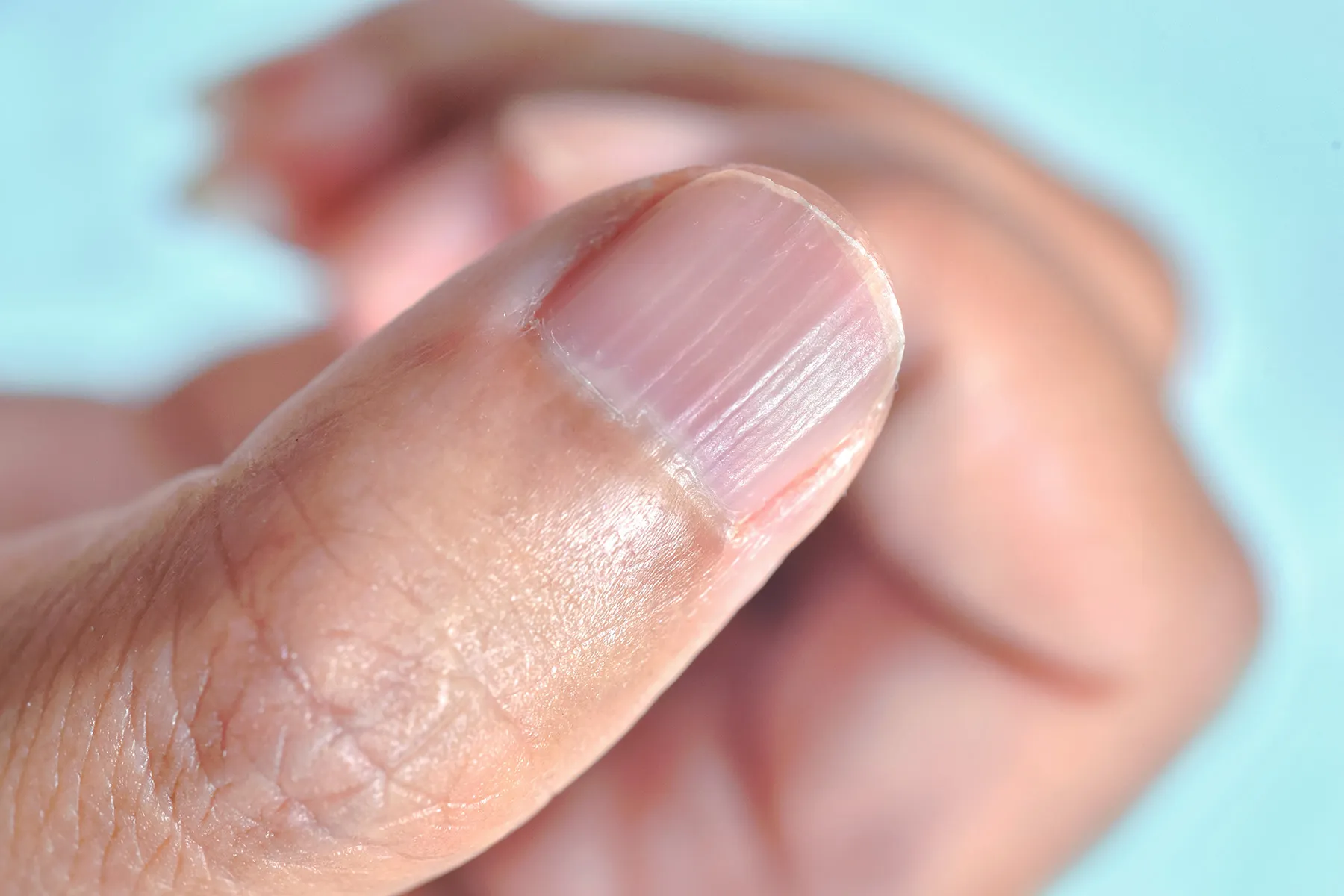
As the body ages, nutrient absorption becomes less efficient, even with a balanced diet. Several vitamins and minerals directly influence nail health:
Biotin: A B-complex vitamin essential for keratin infrastructure. Low biotin can cause brittle, ridged nails.
Iron: Deficiency may lead to spoon-shaped nails or ridging. Iron is critical for oxygen transport and cellular repair.
Zinc: Important for tissue growth and repair. A lack of zinc can result in white spots or ridged nails.
Magnesium: Supports protein synthesis and nail integrity.
People over 40 are more likely to have subclinical deficiencies due to digestive inefficiencies, medication interference, or dietary gaps.
When Vertical Ridges Could Indicate an Underlying Health Problem

While mild ridges are often harmless, sudden changes in nail appearance should be taken seriously. Medical evaluation may be necessary if any of the following symptoms accompany nail ridges:
Discoloration (yellow, brown, or black streaks)
Changes in nail thickness
Pain, inflammation, or redness near the cuticle
Nail separation from the nail bed
Frequent nail splitting or crumbling
Potential health conditions that may manifest in nail changes include:
Thyroid disorders: Both hypothyroidism and hyperthyroidism can alter nail texture and growth patterns.
Rheumatoid arthritis: May cause distorted nail growth or chronic inflammation in nail tissues.
Peripheral vascular disease: Poor blood flow can affect nail health and cause pronounced ridges.
Psoriasis or eczema: Skin disorders often involve nail abnormalities.
Anemia or malnutrition: Long-term deficiencies affect nail strength and resilience.
Are Horizontal Ridges More Concerning?
Yes. Horizontal ridges (Beau’s lines) typically reflect a disruption in nail production due to systemic stress. Causes include:
Severe infections or illness
Chemotherapy
High fever
Uncontrolled diabetes
Physical trauma to the nail matrix
Unlike vertical ridges, which develop gradually, horizontal ridges often emerge abruptly and are more directly linked to specific health events.
Best Practices for Nail Health After 40
Hydration and Moisture Retention
Daily moisturizing is critical. Use hand creams and cuticle oils to prevent drying. Ingredients like shea butter, vitamin E, and lanolin help lock in moisture.
Nutrient-Rich Diet
A balanced diet that includes leafy greens, lean proteins, nuts, seeds, eggs, and legumes can help support healthy nail growth. Foods rich in biotin, zinc, and magnesium are especially important.
Consider Supplements
If your diet is limited or you suspect deficiencies, consult your healthcare provider about supplements. Biotin, iron, and collagen are commonly recommended, but testing is advised before supplementation.
Minimize Damage
Avoid nail biting and picking
Limit use of harsh nail polish removers
Don’t use nails as tools (e.g., opening cans)
Wear gloves when cleaning or gardening
Nail Care Routine
Keep nails trimmed to avoid snagging
Gently file in one direction instead of sawing back and forth
Avoid acrylics or gel nails that require aggressive removal processes
Frequently Asked Questions (FAQ)
Can vertical ridges be completely removed?
No, if they’re age-related, they can’t be “cured.” However, hydration, nutrition, and gentle care can reduce their appearance.
Do vertical ridges mean I have cancer or a serious disease?
Not usually. Isolated ridging is rarely linked to cancer. Sudden or dramatic changes should be evaluated, but ridges alone are typically benign.
Should I buff ridged nails to make them smooth?
Buffing can temporarily smooth the nail, but excessive buffing thins the nail plate and increases breakage. Do it sparingly and with gentle tools.
Does nail polish make ridges worse?
No, but frequent use of acetone-based removers can dry the nails and accentuate ridges. Use polish moderately and opt for hydrating base coats.
Final Thoughts
Vertical ridges on the nails after age 40 are extremely common and generally harmless. They reflect the natural aging process, shifts in nutrient absorption, and years of environmental exposure. While they’re often nothing to worry about, paying attention to your nails is one more way to monitor your internal health.
By maintaining good hydration, eating a nutrient-dense diet, practicing gentle nail care, and staying alert to changes in texture, you can preserve the strength and appearance of your nails well into later life.
If you’re ever unsure whether a change in your nails is normal, don’t hesitate to seek medical advice. Your body has many ways of communicating with you—your nails are just one more voice in the conversation.
From Derek, Mom, and even Dad, all trying to downplay the previous night’s events. They were full of excuses and half-hearted apologies, but I didn’t care to respond. Instead, I focused on Lucas, who was still sniffling, eyes red from crying himself to sleep. I made him breakfast, trying to infuse some normalcy into a day that felt anything but. As he ate, I promised him we’d replace the toys, but the truth is, replacements are never the same. Memories are tied to those items, emotions woven into their threads and plastic.
Later, as Lucas played quietly in his room with the few toys that had survived, the doorbell rang. I opened it to find Dad standing there, looking uncharacteristically anxious.
“Please,” he said, his voice unsteady, “you have to talk to your brother. He’s in trouble at work—about to lose his job. I know you two had a falling out, but he needs your help.”
I met his gaze steadily. “Oh, I know,” I said softly, a small, ironic smile playing on my lips. “That was the plan.”
Dad blinked, taken aback. “What do you mean?”
“It means,” I explained, “that Derek’s behavior has consequences. He thought he could act without repercussions, but maybe now he’ll understand that his actions have weight.”
“You can’t just stand by and do nothing. You’re his brother!”
“Am I?” I countered, the sting of last night still fresh. “Last night, you all made it clear where I stand in this family. I’m just the soft one, remember? But maybe soft isn’t so bad if it means I don’t hurt others for fun.”
Dad was silent, struggling for words. He was caught in a web of his own making, unable to support Derek without acknowledging the toxic traits he had encouraged in his sons.
“Look, I’ll talk to him,” I said finally. “Not because you asked, but because it’s the right thing to do. For Lucas. He deserves to know that people can change, that people can grow.”
Dad nodded, relief washing over his features. “Thank you, Virgil.”
I closed the door, my mind already planning my conversation with Derek. It would be a difficult one, but necessary. As I walked back to Lucas’s room, I felt a sense of clarity.
Later that afternoon, I called Derek and arranged to meet. When we sat down at the café, I could tell he was on edge, but still trying to maintain his bravado.
“You really doing this to me, Virge?” he started, but I cut him off.
“This isn’t about you losing your job. It’s about understanding why you’re in this position. Last night wasn’t just about some toys. It was about respect and understanding. You want to be the tough guy? Fine. But real strength is knowing when to be gentle.”
He looked away, jaw clenched. “And what if I don’t want to change?”
“Then you’ll keep losing the things that matter,” I replied, standing up to leave. “Think about it, Derek.”
I walked away, hoping my brother would realize that true toughness is about resilience, compassion, and, most importantly, the courage to change. As I headed home to Lucas, I felt a flicker of hope that maybe, just maybe, Derek would find his way back to being a brother I could respect.
Later, as Lucas played quietly in his room with the few toys that had survived, the doorbell rang. I opened it to find Dad standing there, looking uncharacteristically anxious.
“Please,” he said, his voice unsteady, “you have to talk to your brother. He’s in trouble at work—about to lose his job. I know you two had a falling out, but he needs your help.”
I met his gaze steadily. “Oh, I know,” I said softly, a small, ironic smile playing on my lips. “That was the plan.”
Dad blinked, taken aback. “What do you mean?”
“It means,” I explained, “that Derek’s behavior has consequences. He thought he could act without repercussions, but maybe now he’ll understand that his actions have weight.”
“You can’t just stand by and do nothing. You’re his brother!”
“Am I?” I countered, the sting of last night still fresh. “Last night, you all made it clear where I stand in this family. I’m just the soft one, remember? But maybe soft isn’t so bad if it means I don’t hurt others for fun.”
Dad was silent, struggling for words. He was caught in a web of his own making, unable to support Derek without acknowledging the toxic traits he had encouraged in his sons.
“Look, I’ll talk to him,” I said finally. “Not because you asked, but because it’s the right thing to do. For Lucas. He deserves to know that people can change, that people can grow.”
Dad nodded, relief washing over his features. “Thank you, Virgil.”
I closed the door, my mind already planning my conversation with Derek. It would be a difficult one, but necessary. As I walked back to Lucas’s room, I felt a sense of clarity.
Later that afternoon, I called Derek and arranged to meet. When we sat down at the café, I could tell he was on edge, but still trying to maintain his bravado.
“You really doing this to me, Virge?” he started, but I cut him off.
“This isn’t about you losing your job. It’s about understanding why you’re in this position. Last night wasn’t just about some toys. It was about respect and understanding. You want to be the tough guy? Fine. But real strength is knowing when to be gentle.”
He looked away, jaw clenched. “And what if I don’t want to change?”
“Then you’ll keep losing the things that matter,” I replied, standing up to leave. “Think about it, Derek.”
I walked away, hoping my brother would realize that true toughness is about resilience, compassion, and, most importantly, the courage to change. As I headed home to Lucas, I felt a flicker of hope that maybe, just maybe, Derek would find his way back to being a brother I could respect.
We have this false belief (at least in the back of our heads) that we can live forever. But sometimes life throws a curve ball that we’ve never expected.
On a regular Sunday morning, Ryan Finley woke up, took a wide stretch and pinched his wife, Jill Finley to wake her up as well.
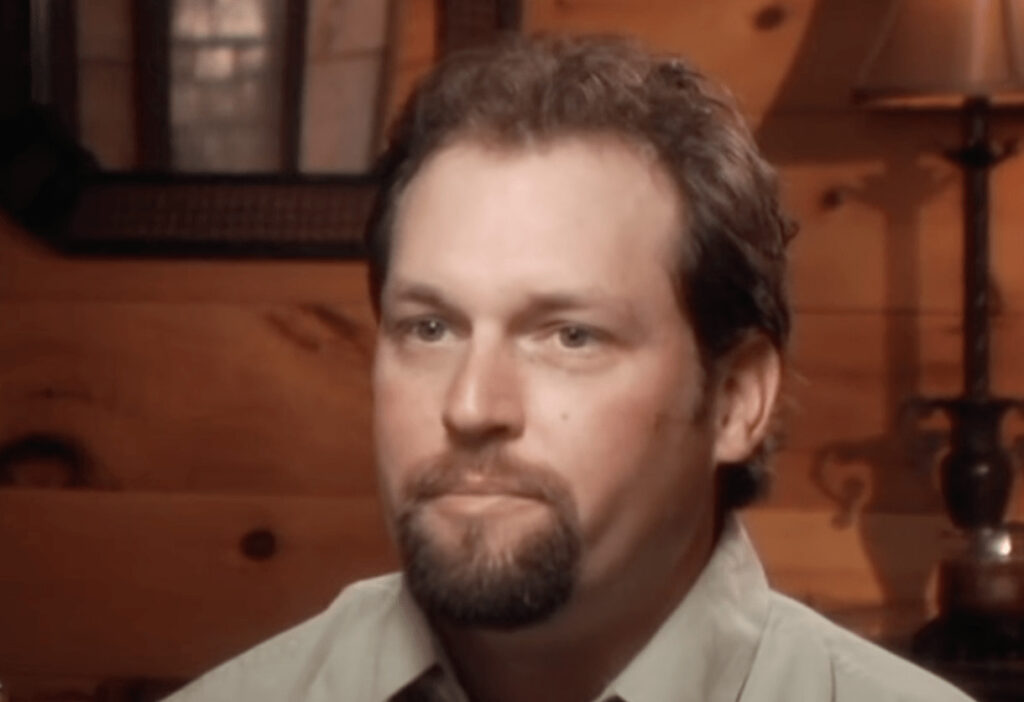
“I went to wake Jill up, which is a miracle in itself as I never, ever, do that on Saturday mornings,” he later recalled.
He called but she didn’t respond. That’s when Ryan’s pulse started to race. He knew something was not right. He immediately called emergency and performed CPR on his wife.
When paramedics arrived they immediately took her to the hospital, with Ryan driving behind it.
After medical checkup, they made a conclusion that Jill suffered a cardiac arrest.
She got a medical procedure done to stabilize her, while Ryan was waiting impatiently outside the ER.
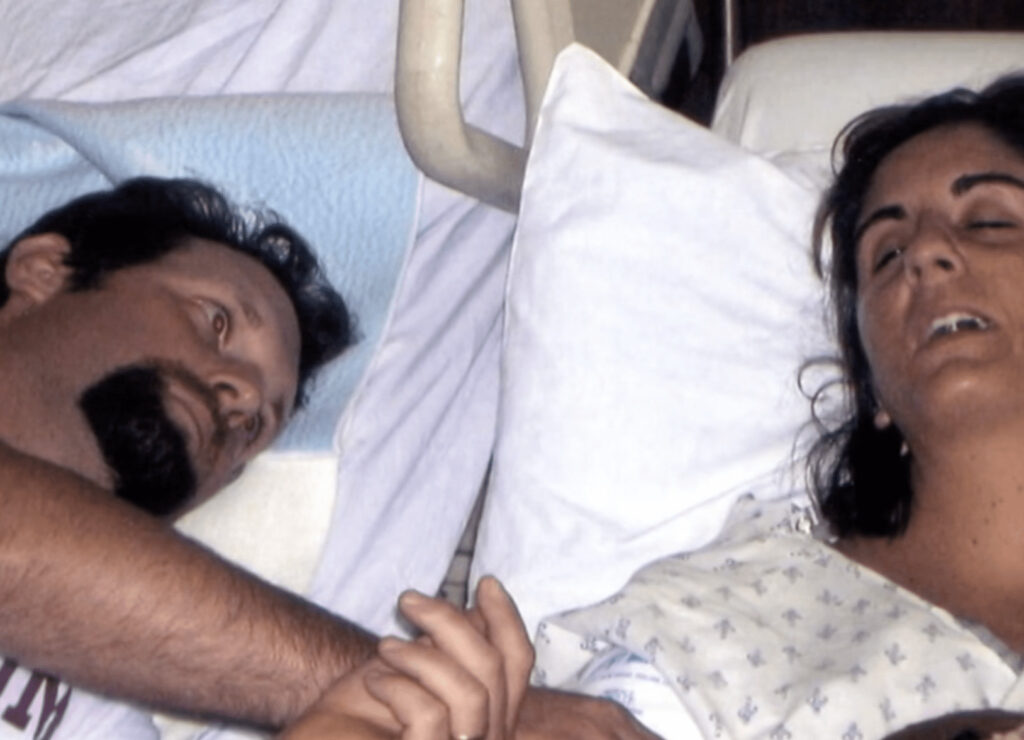
When doctors came out to tell him an update, they finished with “pray for your wife.” Ryan knew when someone tells you that it’s life and death. “When a doctor tells you, you need to start praying, I feel it’s about as serious as it’s going to get.”
Soon after, they informed Ryan that his wife was in a coma.
He just couldn’t fathom the fact that his 31-year-old wife that was alive and well yesterday, now battles with life and death situation…
During the two weeks, Jill was in a coma and got a lot of visitors praying that she would soon wake up and be well. But one day Jill’s cousin came with a Bible in his hand and read to Jill from the Bible for an hour.
He left the Bible to Ryan and told him to read any passages from it if he felt like it.
Ryan made it as a routine to read passages out loud to his wife with high hope that she’d wake up soon.
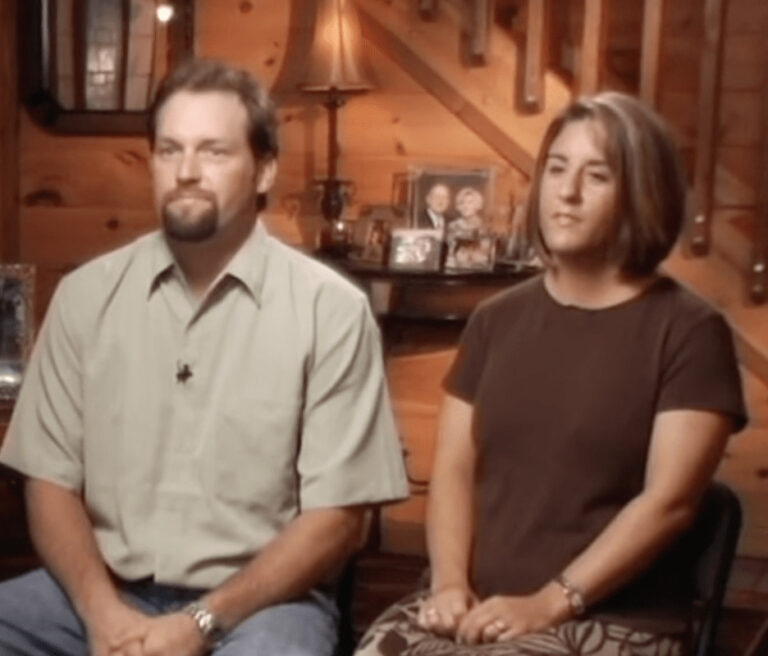
After 11 days, Ryan went home to think about whether to wait for his life or put her off of life support as doctors suggested. Doctors were sure there would be no improvement…
He knew that once they took her off life support, she would pass away shortly. On the 14th day he made the choice to take her off life support and let her go…
About 5 hours when she was removed from life-support, Jill started to mumble and move. Ryan was heartbroken to be present on scene while she suffered and stepped out until she passed away.
He recalls the next moments clearly, “The nurse came out and said, ‘I think you need to come in, she’s talking.’”
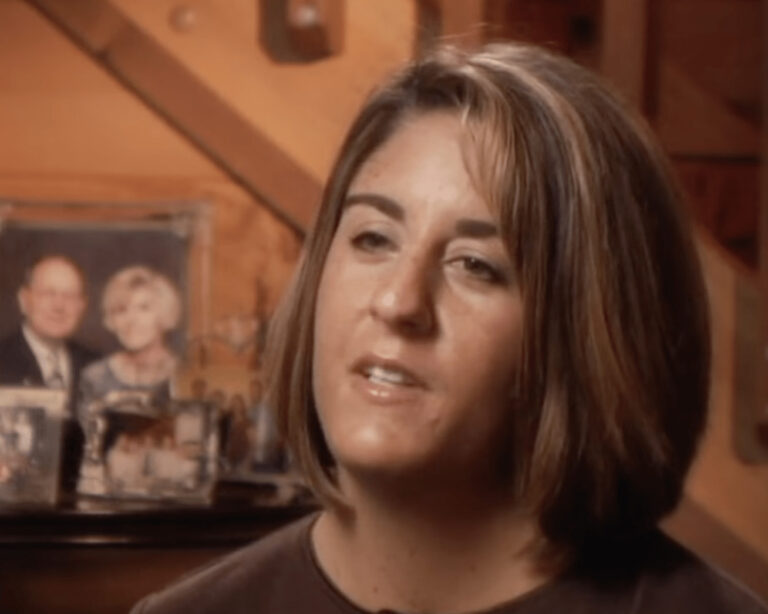
He went in expecting to have the final words as she enters the spiritual realm, but as he walked in he recalls the shock “I walked in and Jill was talking. First thing she said was, ‘Get me out of here. I want to go home.’”
Ryan couldn’t process the situation, he shook his head in disbelief.
He thought she was just mumbling, but then he asked her about their pets’ names and few mental math questions, all of which she answered without an error.
She even asked to go to her favorite Mexican restaurant for dinner. He then knew Jill wasn’t going to the spiritual world… she was coming back home with him.
Ryan was asked what brought his wife back and he replied back without hesitation: “God. Divine intervention. I honestly feel that way.”
It wasn’t as if Jill went back to normal the next day. She had to learn how to brush her teeth again and tie her shoe laces due to decline on some of her motor skills.
But after God gave them a second chance they made sure they would ALWAYS be next to each other, especially when they need it most.
Jill also supports his decision to take her off life support when she was in a coma, as she doesn’t want to spend her life as a “vegetable.”
Ryan says: “there’s still not a night that goes by that I don’t wake up. I’ll usually kick her and if she kicks me back, I know we’re OK.”
We are so happy that both Ryan and Jill Finley are both well and next to each other at all times!
On a regular Sunday morning, Ryan Finley woke up, took a wide stretch and pinched his wife, Jill Finley to wake her up as well.

“I went to wake Jill up, which is a miracle in itself as I never, ever, do that on Saturday mornings,” he later recalled.
He called but she didn’t respond. That’s when Ryan’s pulse started to race. He knew something was not right. He immediately called emergency and performed CPR on his wife.
When paramedics arrived they immediately took her to the hospital, with Ryan driving behind it.
After medical checkup, they made a conclusion that Jill suffered a cardiac arrest.
She got a medical procedure done to stabilize her, while Ryan was waiting impatiently outside the ER.

When doctors came out to tell him an update, they finished with “pray for your wife.” Ryan knew when someone tells you that it’s life and death. “When a doctor tells you, you need to start praying, I feel it’s about as serious as it’s going to get.”
Soon after, they informed Ryan that his wife was in a coma.
He just couldn’t fathom the fact that his 31-year-old wife that was alive and well yesterday, now battles with life and death situation…
During the two weeks, Jill was in a coma and got a lot of visitors praying that she would soon wake up and be well. But one day Jill’s cousin came with a Bible in his hand and read to Jill from the Bible for an hour.
He left the Bible to Ryan and told him to read any passages from it if he felt like it.
Ryan made it as a routine to read passages out loud to his wife with high hope that she’d wake up soon.

After 11 days, Ryan went home to think about whether to wait for his life or put her off of life support as doctors suggested. Doctors were sure there would be no improvement…
He knew that once they took her off life support, she would pass away shortly. On the 14th day he made the choice to take her off life support and let her go…
About 5 hours when she was removed from life-support, Jill started to mumble and move. Ryan was heartbroken to be present on scene while she suffered and stepped out until she passed away.
He recalls the next moments clearly, “The nurse came out and said, ‘I think you need to come in, she’s talking.’”

He went in expecting to have the final words as she enters the spiritual realm, but as he walked in he recalls the shock “I walked in and Jill was talking. First thing she said was, ‘Get me out of here. I want to go home.’”
Ryan couldn’t process the situation, he shook his head in disbelief.
He thought she was just mumbling, but then he asked her about their pets’ names and few mental math questions, all of which she answered without an error.
She even asked to go to her favorite Mexican restaurant for dinner. He then knew Jill wasn’t going to the spiritual world… she was coming back home with him.
Ryan was asked what brought his wife back and he replied back without hesitation: “God. Divine intervention. I honestly feel that way.”
It wasn’t as if Jill went back to normal the next day. She had to learn how to brush her teeth again and tie her shoe laces due to decline on some of her motor skills.
But after God gave them a second chance they made sure they would ALWAYS be next to each other, especially when they need it most.
Jill also supports his decision to take her off life support when she was in a coma, as she doesn’t want to spend her life as a “vegetable.”
Ryan says: “there’s still not a night that goes by that I don’t wake up. I’ll usually kick her and if she kicks me back, I know we’re OK.”
We are so happy that both Ryan and Jill Finley are both well and next to each other at all times!

A somber shadow has fallen over the palace. Just as the Royal Family seemed to be finding moments of joy, a devastating announcement has sent shockwaves through the nation — and the world.Court sources describe the atmosphere at Buckingham Palace as “heavy, almost unbearable.” Flags are at half-mast, and official engagements have been quietly cancelled. The news, delivered in hushed tones to senior royals, has left even the most stoic among them visibly shaken.
Though details remain tightly guarded, insiders confirm this is the most heartbreaking development the family has faced in 2025. “We’ve weathered storms before,” one palace aide told The Daily Gazette, “but this is different… this is personal.”
In a rare moment of public vulnerability, King Charles was seen leaving a private meeting with red-rimmed eyes, his usual composure replaced by a solemn stillness. Queen Camilla, ever the pillar beside him, clutched his arm tightly as they departed together without speaking to reporters.
The reaction inside the royal circle has been equally poignant. Prince William reportedly cut short an overseas engagement, while Princess Catherine has remained out of the public eye entirely. Prince Harry, informed while abroad, is said to be making arrangements to return to the UK “as soon as possible.”
Even palace staff, often accustomed to navigating royal drama, appear subdued. “There’s no gossip, no whispers in the halls,” one footman confided. “Everyone is just… quiet.”Public speculation is mounting. Social media feeds are ablaze with theories, from health concerns to deeply personal family matters. The hashtag #RoyalSadness has trended worldwide within hours of the news breaking.
But amid the mystery, one truth is clear: whatever has happened has struck at the very heart of the monarchy.
An official statement is expected within the coming days, though courtiers warn it may only confirm what insiders already fear — that this is a loss the family will carry for years to come.
For now, the palace gates remain closed, the royal balcony empty, and the streets outside unusually still. A nation waits, holding its breath, bracing for words it does not want to hear.
Because this is not just another chapter in the saga of the royals. This is the story — the one that will define the year… and perhaps change the family forever.
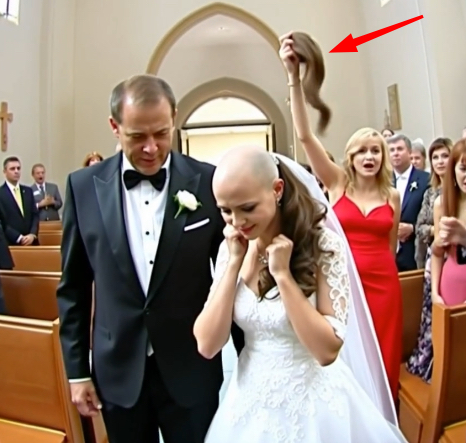
The room fell silent as if time itself had paused to witness the aftermath of my mother-in-law’s cruel act. My heart pounded in my chest, the sound almost deafening in the quiet that enveloped us. Tears streamed down my face, mingling with the shock and humiliation that coursed through my veins. I could see the guests shifting awkwardly, unsure of how to react to such an unexpected display of malice.
But then, from amidst the stunned crowd, a voice broke the silence. It was my childhood friend, Lucy, who had flown in from across the country to be there on my special day. Her voice was strong and unwavering as she addressed the room.
“Is this really what we’ve come to celebrate?” she asked, her tone both accusatory and supportive. “This is a wedding, a union of love and strength. And in front of us stands a woman who has shown more courage and resilience than most of us can imagine.”
Her words struck a chord, resonating through the crowd. People began to nod, murmur in agreement, and a sense of unity slowly began to replace the awkward tension. The groom, my beloved partner who had stood by me through every challenge, turned to face the guests.
“This is the woman I love,” he said, his voice steady and filled with conviction. “She is my strength, my inspiration, and the person I want to spend the rest of my life with. Her courage and battle against cancer only make her more beautiful in my eyes.”
His unwavering support sent a ripple through the room, and suddenly, something incredible happened. One by one, the guests began to stand in solidarity. Friends, family, even those who had initially laughed now looked at me with admiration. They approached, offering words of support and love, forming a protective circle around us.
And then, unexpectedly, my mother-in-law’s own husband stepped forward. He had been a quiet man, often overshadowed by his wife’s imposing presence, but now he spoke with a quiet authority that commanded attention.
“This is not the way to treat family,” he said, looking directly at his wife. “What you did was wrong, and it’s time to apologize.”
Her expression shifted, the confidence that had fueled her cruel act now replaced by a flicker of doubt and regret. The realization of what she had done, how deeply she had hurt not just me but her son and everyone present, was now dawning on her.
She took a hesitant step forward, her eyes meeting mine. “I… I’m sorry,” she stammered, her voice barely audible. “I shouldn’t have done that.”
In that moment, the power dynamics shifted. She, who had sought to humiliate me, was now seeking forgiveness, redemption in the eyes of her family and the community. I took a deep breath, feeling the strength and love of those around me.
“I forgive you,” I replied softly, not for her sake but for mine. It was a release, a letting go of the hurt, so that the day could be remembered not for her cruelty, but for the love and solidarity that overcame it.
The wedding continued, not as we had planned, but in a way that was infinitely more meaningful. It became a celebration not just of our union, but of the strength and resilience that defines true love and community. And as we danced into the night, I felt a sense of peace, knowing that I was surrounded by people who truly cared.
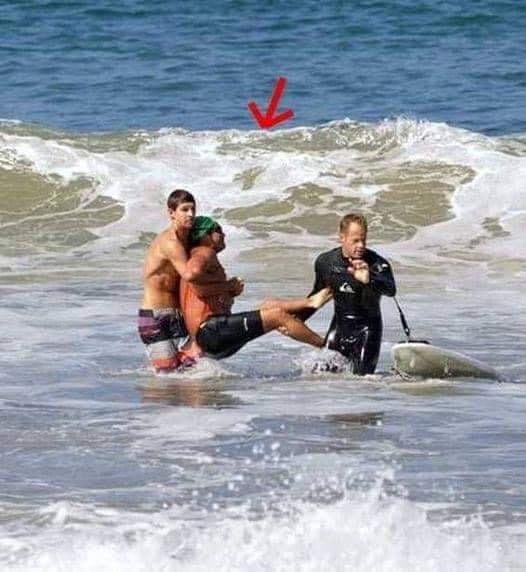
A lifeguard and surf instructor, who had roles in movies like Pirates of the Caribbean: On Stranger Tides and Blue Crush, died Sunday due to a suspected shark attack on Oahu’s North Shore, Hawaii, officials reported.
Tamayo Perry, 49, was a respected North Shore waterman and had served with Honolulu Ocean Safety for eight years, according to a statement by Honolulu Mayor Rick Blangiardi.
“It is with profound sadness that we mourn the loss of one of our incredibly dedicated City and County of Honolulu lifeguards, who tragically lost his life today in an apparent shark attack on the North Shore,” Blangiardi said. “Our hearts go out to his family, friends, and colleagues in Ocean Safety during this incredibly difficult time.”
Perry “exemplified bravery, commitment and a deep sense of duty, serving our community with unwavering dedication. His heroic actions and tireless efforts to ensure the safety of our residents and visitors will never be forgotten,” Blangiardi added.
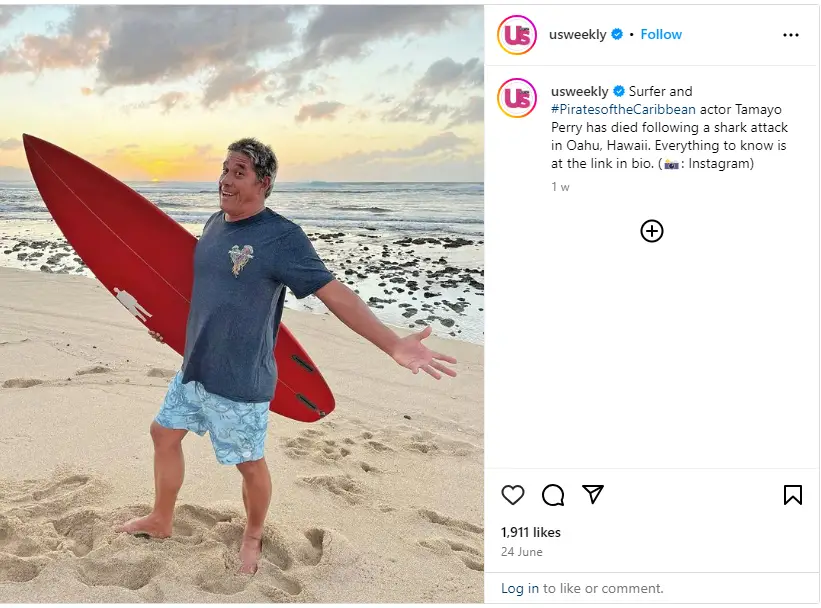
The Honolulu Emergency Services Department issued a statement writing a surfer was “fatally injured” in a shark attack off Goat Island on June 23, just before 1 p.m. local time.
The person who called the emergency services reported that the surfer’s body had multiple bite wounds.
His body was brought ashore by lifeguards using a Jet Ski, and EMS paramedics declared him dead at the scene, officials said. The surfer was identified as Perry, confirmed by Ocean Safety.
Acting Chief Kurt Lager of Honolulu Ocean Safety stated at a press conference, “Tamayo Perry was a lifeguard loved by all.”

Emilia Perry, a fellow surfer, said of her husband, “Tragic though his passing may be, he left this world doing what he loved, where he loved to do it.”
According to Surfer magazine, Perry was renowned for his expertise at Pipeline, one of the world’s most famous surf breaks, located off Ehukai Beach Park on Oahu’s north side.
The Encyclopedia of Surfing notes that he was close friends with singer Jack Johnson and was born and raised on Oahu’s east side.
Perry and his spouse ran a surf school together on the North Shore of Oahu.
On Monday, condolences poured in from across the surfing community.
“This one is hard to believe,” surfing legend Kelly Slater wrote, “Your truly lived the life you loved.”
We are so very sorry for this loss. May he rest in peace.

“Even the husband was ashamed of her vulgar outfit!” Brooklyn Beckham’s wife caused a stir when paparazzi caught her in black lingerie and a completely see-through dress. Fans and critics couldn’t stop commenting on her bold look, and many noticed her husband’s discomfort. See the photos in the article below

The outrageous style of Brooklyn’s wife has never ceased to cause a stir and become the topic of discussions. Sometimes, she appears in such bold and revealing outfits that immediately cause a stir.
Her most recent outfit in black lingerie and a completely transparent jumpsuit immediately made a splash. Neither fans nor ill-wishers could remain silent and all of them rushed to comment on her extravagant look.
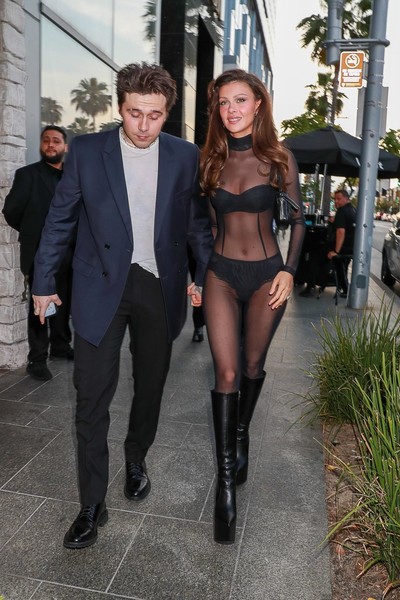
It seemed as if her husband was ashamed too. Some were wondering how and why he let her go out like this. Some clearly noticed that he got confused when he saw that all eyes were on his wife.
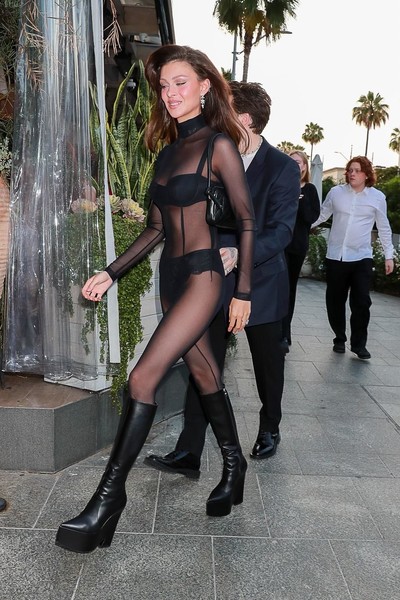

A girl called the police and said her father was under the floor: when the officers started removing the floorboards, they found something terrible 😱😱
A strange and alarming call came into the local police station.
“Hello…” sobbed a thin voice of a girl about eight years old. “Please help… my dad is under the floor…”
The duty officer frowned and exchanged glances with his colleague.
“Under the floor? Girl, can you pass the phone to your mom or dad?”
“Dad hasn’t been home for days. And mom doesn’t believe me, she says I’m making it up. But I know he’s under the floor. He told me himself.”

“Wait…,” said the man, adopting a more serious tone. “How did he tell you if he’s not home?”
“I saw him in a dream,” whispered the girl. “He said he went far away… and is lying under the floor…”
At first, the police laughed, thinking the child had psychological problems and were about to pass the case to social services. But something in her voice — her desperate sincerity — made them take the call seriously.
“We’ll check just in case,” said one of the officers. “What if it’s true…”
When they arrived at the address, they were greeted by the girl’s mother — a neat, slightly nervous woman of about forty. She was surprised by the visit but let them in. The girl stood silently beside her, clutching her teddy bear tightly, and pointed to a spot by the living room wall. Right under the new laminate flooring.
The police decided to dig at the spot the girl indicated, and what they found shocked everyone 😱😱 Continued in the first comment 👇👇
“Where is your husband?” the police first asked.
“On a business trip,” the woman answered quickly. “In another city… I think in… Serbia. Or Slovenia. I don’t remember exactly. He travels a lot.”
“Can you call him?”
“His phone is dead,” she stammered. “Probably…”

While one officer tried unsuccessfully to reach the husband, another questioned the neighbors. No one had seen the man for over a week.
He hadn’t gone to work or contacted anyone. No airline had any flights registered under his name.
When the police said they wanted to open part of the floor, the mother became nervous.
“We just finished renovating! Do you know how much it cost? Who will pay for the damage?!”
“If we find nothing, the insurance will cover everything,” the senior officer answered dryly.
They began removing the boards at the spot the girl pointed to.
After a few minutes, a scream was heard. One officer jumped back sharply, dropping his crowbar. In the silence, like thunder from a clear sky, it was heard:
“We found… a body.”
Under the floor, they extracted a man’s body. Wrapped in construction plastic, partially covered with expanding foam and concrete. Almost no signs of struggle. Apparently, he died from a single strong blow to the temple.
Later, the examination confirmed everything. During an argument, the woman struck her husband with a heavy object. Realizing he was dead, she decided to hide the crime, taking advantage of the renovation work in the house.

The workers thought she just asked to “fill the floor a bit deeper.” No one suspected anything.
And the girl… The girl really saw her father in a dream. He came to her, smiled sadly, and said:
“Tell them. I am under the floor. I am close. Don’t be afraid.”
And she told.
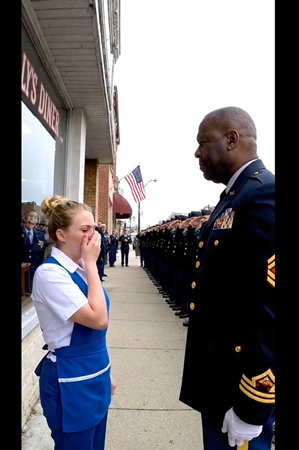
My name is Clara James. I’m 32 years old, and until one unforgettable Tuesday, I lived most of my life quietly, blending into the background of Ridgefield, Kentucky — the kind of small town where time seems to move slower, and people carry their worries like extra weight in their pockets.
I worked as a waitress at Billy’s Diner, a modest place with cracked vinyl booths and coffee that tasted stronger than the economy supporting our town.
After the local manufacturing plant closed years ago, the heart of Ridgefield slowed. Main Street’s faded signs whispered nostalgia, and familiar faces wore tired expressions that spoke of long hours and uncertain tomorrows.
Being “invisible” wasn’t something I intended — it was something that grew around me, the way vines wrap around an old fence. Customers recognized my apron, not my name.
I opened the diner before sunrise and often closed long after the last plate had been washed. Very few people wondered why.
No one knew about my tiny room above an auto shop where the heater rattled through the night.
No one knew I shared that space with Smokey, my one-eyed rescue cat, or that after my roommate moved out unexpectedly, I was left scrambling to pay rent on a paycheck that stretched thinner every month.
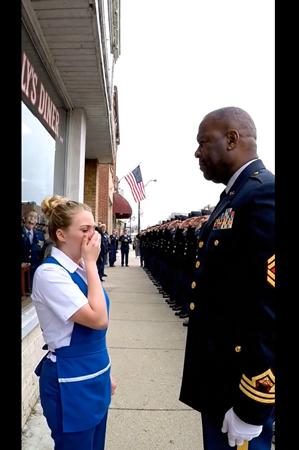
And no one knew about the shoebox beneath my bed holding my grandfather’s Korean War medals — the last pieces of the man who raised me, taught me resilience, and told me that dignity begins with how we treat others, even when no one is watching.
“Honor isn’t loud, Clara,” he used to say. “It’s the quiet choices. The ones no one praises, but your heart remembers.”
Chapter 2: The Storm and the Stranger
That Tuesday the sky opened up violently. Sheets of rain slammed against the diner windows, turning the parking lot into a river. Only a few regulars remained, hunched over their steaming mugs, staring at the downpour.
The bell over the door creaked, and cold air swirled in.
A stranger stood in the doorway — drenched, shivering, and exhausted. His coat was a worn, military-style green, its frayed edges clinging to him like a second skin.
A faded U.S. Army patch, barely intact, clung to his sleeve. His beard was untrimmed, and his hands trembled as he pressed them against the doorframe for balance.
He limped slowly to the far booth, using the table for support. But he didn’t sit. He stood there, as though asking permission simply to exist in a warm space.
I approached with a towel, my heart tightening in my chest.
“Evening,” I said gently. “Can I get you something warm?”
For a moment he didn’t respond. His eyes stayed on the floor, heavy with defeat. When he finally looked up, I saw the familiar tug-of-war between pride and survival.
“Just… just a cup of hot water, ma’am,” he whispered. “And maybe a piece of bread… if it’s going to be thrown out.”
The entire diner seemed to pause.
His words echoed my grandfather’s stories — about cold nights in Korea, when a stranger shared a crust of bread that kept him going. That memory struck something deep inside me.
Chapter 3: The Choice
In the kitchen, under the heat lamps, sat a steaming plate of chicken and dumplings — a dish returned by a customer who’d left early. It would be thrown away.
Without hesitation, I plated it neatly, added warm bread, and poured a fresh cup of coffee. I carried it to the man with a quiet resolve.
“This was just returned,” I told him softly. “Still hot.”
He stared at the plate, stunned. “I can’t pay for this.”
“It’s already paid for,” I said, offering a small smile. “And the coffee is on me.”
He ate slowly, reverently, as though every bite carried meaning. When he whispered, “You remind me of my wife,” I felt my throat tighten.
Chapter 4: The Boss’s Rage
The peaceful moment shattered the instant Wayne Becker — the diner’s owner — stepped out from the back.
He spotted the man and stopped dead. His face soured.
“What is he doing here?” Wayne barked. “I told you we don’t serve people like that.”
“He’s a veteran, Wayne,” I said quietly. “And the food was going to be thrown out.”
“I don’t care!” he snapped. “He’s not a paying customer. Get him out.”
When I insisted the meal came from returned food, Wayne’s temper exploded. He grabbed the man’s half-eaten plate and slammed it onto the floor. Food splattered across the tiles. The ceramic shattered loudly. The man recoiled, shielding his face in reflexive fear.
“You’re fired, Clara,” Wayne spat. “Get out. Now.”
I untied my apron — the one I’d worn for six years — placed it calmly on the counter, and walked out into the rain.
Before I left, the man pressed something into my hand: a rusted dog tag.
“Eli Turner,” he whispered. “If I don’t make it through this winter… at least someone will remember my name.”
Chapter 5: What the Internet Gets Wrong
By morning, a shaky cell-phone video of the incident had spread online. But instead of compassion, the internet did what the internet often does.
“Rules are rules. She had no right.”
“She was probably giving free food away all the time.”
“The owner did what he had to do.”
Everyone had an opinion — except the people who knew the truth.
For the next two days, I walked door to door searching for work. Each restaurant declined politely, not wanting controversy attached to their business. I felt smaller and smaller.
Chapter 6: A Small Act in a Cold World
On the third night, exhausted and freezing, I passed a bus shelter. There on the bench, wrapped in a thin plastic sheet, was Eli.
I knelt beside him and gently shook his shoulder. “It’s me,” I whispered. “Clara.”
He opened his eyes weakly.
I offered him the only food I had left: half of a sandwich.
“You forgot this,” I said softly.
He understood what I meant — and what I didn’t need to say.
Kindness doesn’t check the weather. It doesn’t wait until you’re comfortable.
Chapter 7: The Army Arrives
The next morning, pounding on my door startled me awake. A reporter stood outside.
“You need to come to the diner,” she insisted. “Right now.”
Confused, I followed her downtown — and froze.
Hundreds of uniformed service members stood in formation along Main Street.
Army. Navy. Marines. Air Force.
The entire block was silent.
As I stepped into view, the formation opened into a corridor leading toward the diner’s entrance. Then, in perfect unison, every service member saluted me.
My breath stalled. My vision blurred.
A tall man in a decorated Army uniform stepped forward.
“Ms. Clara James?” he asked.
“Yes…”
“I’m Colonel Matthew Turner,” he said. “Eli Turner is my father.”
Chapter 8: The Truth Behind the Hero
Colonel Turner explained that Eli had been missing for months. His family had been searching, contacting shelters, outreach centers, and hospitals.
“Ms. James,” he continued, “my father is alive today because people like you continue to exist.”
Inside the diner, Wayne stood speechless.
“This is the man you called ‘trash,’” the Colonel said sharply. “This man carried me three miles under enemy fire in 2007. He saved my life — and the lives of eleven soldiers in my unit.”
He held up a small, velvet box.
“My father gave away his Silver Star years ago to help a struggling family. We recovered it. He wants you to have it.”
I shook my head. “I can’t—”
“You already earned it,” he replied quietly. “For seeing humanity where others saw inconvenience.”
Chapter 9: A Town Rebuilt Through Kindness
The incident sparked something unexpected. Not outrage, but reflection.
Billy’s Diner closed within a week due to community pressure. Veterans’ groups rallied together. Local businesses donated food and supplies. A veteran-founded nonprofit reached out and offered me a job managing a new community kitchen.
Today, that kitchen serves hot meals to anyone who needs one — veterans, families, seniors, and anyone who feels invisible.
Eli lives in stable VA housing, surrounded by care, support, and dignity. He volunteers weekly, sharing stories that remind younger generations what service truly means. His son visits often, ensuring his father is finally receiving the respect he earned.
Chapter 10: Three Years Later
The Ridgefield Community Kitchen now serves over 300 meals weekly. The program expanded into job training, housing transition assistance, and mental-health support — especially for veterans. Donations come from all over the country.
The Silver Star sits in a small wooden box on my desk, beside my grandfather’s war medals — symbols of courage, sacrifice, and the quiet strength that holds communities together.
Sometimes, when the sun sets over Ridgefield and the lights of the kitchen glow warmly on tired faces, I hear my grandfather’s voice again:
“Honor isn’t loud, Clara. It’s quiet.”
And I understand it more clearly now.
Honor is a meal offered without judgment.
It’s choosing dignity over convenience.
It’s recognizing humanity where others overlook it.
It’s standing tall when standing tall costs you everything.
And sometimes — sometimes — that quiet honor is enough to change the world.
Dorothy Mitchell had lived in apartment 4B for nearly half a century, long enough for the building’s wallpaper to change three times, for neighbors to grow old or move away, and for the city’s restless noise outside to become both familiar and strangely distant.
Her home, filled with antique lamps, soft blankets, and an aging armchair positioned just beneath a window that overlooked the courtyard, had become her sanctuary. Yet despite its comfort, the rooms held a quiet that stretched into her days like a long shadow.
Her husband’s belongings still remained where he’d last placed them years ago, preserved like fragile reminders of a life once filled with companionship and laughter. To Dorothy, every picture frame, every knick-knack, every worn-out cushion carried a piece of a memory she didn’t want to let fade.
Each morning, she awakened slowly, wrapping herself in a warm shawl before shuffling through her apartment. Her days followed a gentle routine — brewing a cup of tea, watering her plants, and sitting by the window to watch the world move without her.
The home care nurses sent by the agency came and went with the passing weeks, their faces blending together in her mind. They were kind, but distant, performing their duties efficiently before hurrying on to their next appointment.
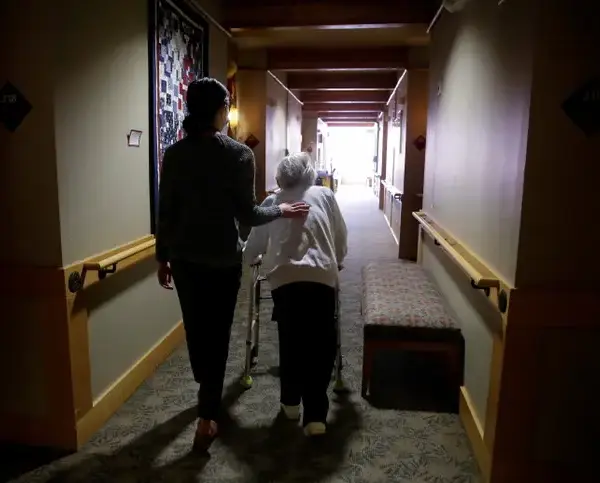
None stayed long enough to understand the sadness in her eyes when she talked about her late husband or the quiet longing in her voice when she mentioned her children who lived hours away and visited less frequently than she wished.
As the years passed, loneliness wrapped itself around her like an invisible blanket. It was not dramatic or overwhelming — it was gentle, persistent, present. Dorothy had learned to live with it, but it crept into every hour of her day.
She would sometimes leave her door slightly open, allowing the soft echoes of footsteps, murmurs, and the occasional laughter from the hallway to drift inside.
She didn’t expect visitors; she simply wanted a reminder that she was still part of the building, still part of something, still alive in the world.
Her neighbors often saw her watching from her doorway, her eyes filled with a delicate hope that someone might pause even for a moment to greet her.
Then came that snowy afternoon — the day everything shifted. The storm outside was heavy, coating the sidewalks and windows with frost. I remember hearing the elevator groan as it climbed to our floor, followed by the slow, deliberate sound of boots stepping onto the hallway carpet.
When I peeked through my peephole, I saw him: a tall man with a rugged frame, tattoos tracing up his arms, wearing a well-worn leather jacket and holding several bags of groceries.
His presence was so unexpected, so striking, that I instinctively assumed something unusual was happening. Those grocery bags were unmistakably Dorothy’s — the same items she ordered every week.
Before I could jump to conclusions, Dorothy opened her door wide — wider than she ever opened it for anyone — and welcomed him inside with a warmth I hadn’t seen in years. Her smile was bright, genuine, and filled with a sense of comfort that came only from trust.
The man, introducing himself as Michael, stepped into her apartment with ease, gently placing the groceries on her counter as though he had been doing it for years.
There was nothing hurried or awkward in his movements. He unpacked the bags carefully, making sure each item was placed exactly where Dorothy preferred.
I watched as he spoke to her — softly, respectfully, attentively. He listened to her stories, asked about her day, and checked on her medication with a familiarity that didn’t belong to a stranger.
It was clear from the gentle rhythm of their conversation that their connection had been growing quietly for weeks, maybe even months, without anyone else noticing.
Later that evening, I visited Dorothy, my curiosity too strong to ignore. When I asked her who Michael was, she smiled in a way I hadn’t seen in years — a smile that held gratitude, comfort, and something like renewed purpose.
She told me the story: a few weeks earlier, she had slipped near the building’s entrance while trying to steady herself on her cane.
She would have fallen if Michael hadn’t stepped in at the perfect moment, catching her before she hit the ground. Instead of shrugging off the incident and walking away, he brought her inside, made sure she was okay, and checked on her again the next day.
And then the next. And the next after that.
Their friendship grew naturally, built on small gestures of kindness. He learned she struggled to lift heavy grocery bags, so he offered to help. He noticed she enjoyed conversation, so he stayed a little longer each time.
He saw the loneliness behind her eyes, and without making her feel pitied or fragile, he began filling her days with warmth, presence, and companionship. Dorothy wasn’t just another person to assist — she became someone he genuinely cared about.
Her children, at first, were cautious when they heard about Michael. They worried, questioned, and wondered how someone who looked so different from their mother’s usual circle had become such an important part of her life.
But as they visited more frequently, they saw the undeniable truth — Dorothy was happier. Her home felt warm again. She talked more. She laughed more.
She walked with renewed confidence, eager to share her days with someone who listened to her stories as if they mattered. The transformation was undeniable.
From across the hall, I watched an unexpected, beautiful friendship blossom — a friendship built not on similarities, but on compassion.
Dorothy, gentle and wise, and Michael, strong and soft-hearted, found a connection that defied expectation. He brought energy into her world, and she brought calm into his.
They balanced one another in a way that made perfect sense, even if their lives had taken wildly different paths.
In her final years, Dorothy’s life was filled with moments she had thought she would never experience again — genuine companionship, heartfelt conversations, and the warmth of being truly seen.
She often told me that Michael made her feel alive again, that he treated her with the dignity and respect she once feared she had lost to time.
Michael never wanted recognition. To him, helping Dorothy wasn’t an act of charity — it was an expression of humanity. He once told her, “Everyone deserves someone who cares,” and he lived out those words every day he spent by her side.
Dorothy’s final seasons were gentler than the years before them, not because life became easier, but because Michael’s presence brought light into her quiet world.
He was there when she needed help, but he was also there when she simply needed a friend. In the end, their connection reminded everyone who knew them that compassion is powerful, that friendships can form in the most unlikely places, and that sometimes, the brightest parts of our lives arrive when we least expect them.
Dorothy found peace not in grand gestures, but in the simple truth that she mattered — to someone, deeply.
And for her, that unexpected friend — the man with tattoos, the leather jacket, and the Harley parked outside — became the greatest blessing of her final years.
Dorothy Mitchell had lived in apartment 4B for nearly half a century, long enough for the building’s wallpaper to change three times, for neighbors to grow old or move away, and for the city’s restless noise outside to become both familiar and strangely distant.
Her home, filled with antique lamps, soft blankets, and an aging armchair positioned just beneath a window that overlooked the courtyard, had become her sanctuary. Yet despite its comfort, the rooms held a quiet that stretched into her days like a long shadow.
Her husband’s belongings still remained where he’d last placed them years ago, preserved like fragile reminders of a life once filled with companionship and laughter. To Dorothy, every picture frame, every knick-knack, every worn-out cushion carried a piece of a memory she didn’t want to let fade.
Each morning, she awakened slowly, wrapping herself in a warm shawl before shuffling through her apartment. Her days followed a gentle routine — brewing a cup of tea, watering her plants, and sitting by the window to watch the world move without her.
The home care nurses sent by the agency came and went with the passing weeks, their faces blending together in her mind. They were kind, but distant, performing their duties efficiently before hurrying on to their next appointment.

None stayed long enough to understand the sadness in her eyes when she talked about her late husband or the quiet longing in her voice when she mentioned her children who lived hours away and visited less frequently than she wished.
As the years passed, loneliness wrapped itself around her like an invisible blanket. It was not dramatic or overwhelming — it was gentle, persistent, present. Dorothy had learned to live with it, but it crept into every hour of her day.
She would sometimes leave her door slightly open, allowing the soft echoes of footsteps, murmurs, and the occasional laughter from the hallway to drift inside.
She didn’t expect visitors; she simply wanted a reminder that she was still part of the building, still part of something, still alive in the world.
Her neighbors often saw her watching from her doorway, her eyes filled with a delicate hope that someone might pause even for a moment to greet her.
Then came that snowy afternoon — the day everything shifted. The storm outside was heavy, coating the sidewalks and windows with frost. I remember hearing the elevator groan as it climbed to our floor, followed by the slow, deliberate sound of boots stepping onto the hallway carpet.
When I peeked through my peephole, I saw him: a tall man with a rugged frame, tattoos tracing up his arms, wearing a well-worn leather jacket and holding several bags of groceries.
His presence was so unexpected, so striking, that I instinctively assumed something unusual was happening. Those grocery bags were unmistakably Dorothy’s — the same items she ordered every week.
Before I could jump to conclusions, Dorothy opened her door wide — wider than she ever opened it for anyone — and welcomed him inside with a warmth I hadn’t seen in years. Her smile was bright, genuine, and filled with a sense of comfort that came only from trust.
The man, introducing himself as Michael, stepped into her apartment with ease, gently placing the groceries on her counter as though he had been doing it for years.
There was nothing hurried or awkward in his movements. He unpacked the bags carefully, making sure each item was placed exactly where Dorothy preferred.
I watched as he spoke to her — softly, respectfully, attentively. He listened to her stories, asked about her day, and checked on her medication with a familiarity that didn’t belong to a stranger.
It was clear from the gentle rhythm of their conversation that their connection had been growing quietly for weeks, maybe even months, without anyone else noticing.
Later that evening, I visited Dorothy, my curiosity too strong to ignore. When I asked her who Michael was, she smiled in a way I hadn’t seen in years — a smile that held gratitude, comfort, and something like renewed purpose.
She told me the story: a few weeks earlier, she had slipped near the building’s entrance while trying to steady herself on her cane.
She would have fallen if Michael hadn’t stepped in at the perfect moment, catching her before she hit the ground. Instead of shrugging off the incident and walking away, he brought her inside, made sure she was okay, and checked on her again the next day.
And then the next. And the next after that.
Their friendship grew naturally, built on small gestures of kindness. He learned she struggled to lift heavy grocery bags, so he offered to help. He noticed she enjoyed conversation, so he stayed a little longer each time.
He saw the loneliness behind her eyes, and without making her feel pitied or fragile, he began filling her days with warmth, presence, and companionship. Dorothy wasn’t just another person to assist — she became someone he genuinely cared about.
Her children, at first, were cautious when they heard about Michael. They worried, questioned, and wondered how someone who looked so different from their mother’s usual circle had become such an important part of her life.
But as they visited more frequently, they saw the undeniable truth — Dorothy was happier. Her home felt warm again. She talked more. She laughed more.
She walked with renewed confidence, eager to share her days with someone who listened to her stories as if they mattered. The transformation was undeniable.
From across the hall, I watched an unexpected, beautiful friendship blossom — a friendship built not on similarities, but on compassion.
Dorothy, gentle and wise, and Michael, strong and soft-hearted, found a connection that defied expectation. He brought energy into her world, and she brought calm into his.
They balanced one another in a way that made perfect sense, even if their lives had taken wildly different paths.
In her final years, Dorothy’s life was filled with moments she had thought she would never experience again — genuine companionship, heartfelt conversations, and the warmth of being truly seen.
She often told me that Michael made her feel alive again, that he treated her with the dignity and respect she once feared she had lost to time.
Michael never wanted recognition. To him, helping Dorothy wasn’t an act of charity — it was an expression of humanity. He once told her, “Everyone deserves someone who cares,” and he lived out those words every day he spent by her side.
Dorothy’s final seasons were gentler than the years before them, not because life became easier, but because Michael’s presence brought light into her quiet world.
He was there when she needed help, but he was also there when she simply needed a friend. In the end, their connection reminded everyone who knew them that compassion is powerful, that friendships can form in the most unlikely places, and that sometimes, the brightest parts of our lives arrive when we least expect them.
Dorothy found peace not in grand gestures, but in the simple truth that she mattered — to someone, deeply.
And for her, that unexpected friend — the man with tattoos, the leather jacket, and the Harley parked outside — became the greatest blessing of her final years.
Dorothy Mitchell had lived in apartment 4B for nearly half a century, long enough for the building’s wallpaper to change three times, for neighbors to grow old or move away, and for the city’s restless noise outside to become both familiar and strangely distant.
 Top Video Viral
Top Video Viral
